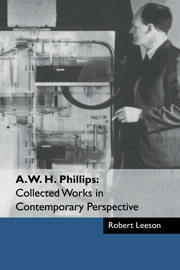Book contents
- Frontmatter
- Contents
- List of contributors
- Foreword by Arthur Brown
- Preface by Robert Leeson
- Part I Bill Phillips: Some Memories and Reflections
- 1 A. W. H. Phillips: An extraordinary life
- 2 The versatile genius
- 3 To be his colleague was to be his friend
- 4 Phillips' adaptive expectations formula
- 5 Economist – washing machine fixer
- 6 Playing around with some data
- 7 The Festschrift
- Part II The Phillips Machine
- Part III Dynamic Stabilisation
- Part IV Econometrics
- References
- Index of names
- Index of subjects
3 - To be his colleague was to be his friend
Published online by Cambridge University Press: 04 May 2010
- Frontmatter
- Contents
- List of contributors
- Foreword by Arthur Brown
- Preface by Robert Leeson
- Part I Bill Phillips: Some Memories and Reflections
- 1 A. W. H. Phillips: An extraordinary life
- 2 The versatile genius
- 3 To be his colleague was to be his friend
- 4 Phillips' adaptive expectations formula
- 5 Economist – washing machine fixer
- 6 Playing around with some data
- 7 The Festschrift
- Part II The Phillips Machine
- Part III Dynamic Stabilisation
- Part IV Econometrics
- References
- Index of names
- Index of subjects
Summary
By the time I got to know Bill Phillips, I think he had put his experiences as a prisoner behind him. He had borne them with the toughness and sustained morale that I took to be typical of his countrymen. The only other particular that I remember him mentioning was that he set himself to learn Chinese with the aid of a Chinese fellow prisoner. Thus began an interest in China which was a factor in his decision to leave econometrics at the LSE for Chinese Studies at the ANU.
Bill did not talk readily about his prisoner-of-war experiences. I remember only once, walking with him in the garden of his house in Hampstead, when he was moved to speak of some recollections. One of these was of a Japanese sergeant, who was subject to fits of rage, and would beat the prisoners with an iron bar. One evening he gathered Bill with two or three other prisoners and took them down to his quarters, when he showed them photographs of his wife and children, and burst into tears.
I can well believe that his decision to give up engineering for sociology when he came back from the war was prompted by his observation of the spontaneous formation of social structures among the individuals who were thrown together in the prison camp. I also know that his employment, when he first came to London before the war, as a supervisor of a gang laying electrical cables, confronted his always active and inquiring mind with issues of industrial psychology.
- Type
- Chapter
- Information
- Publisher: Cambridge University PressPrint publication year: 2000



